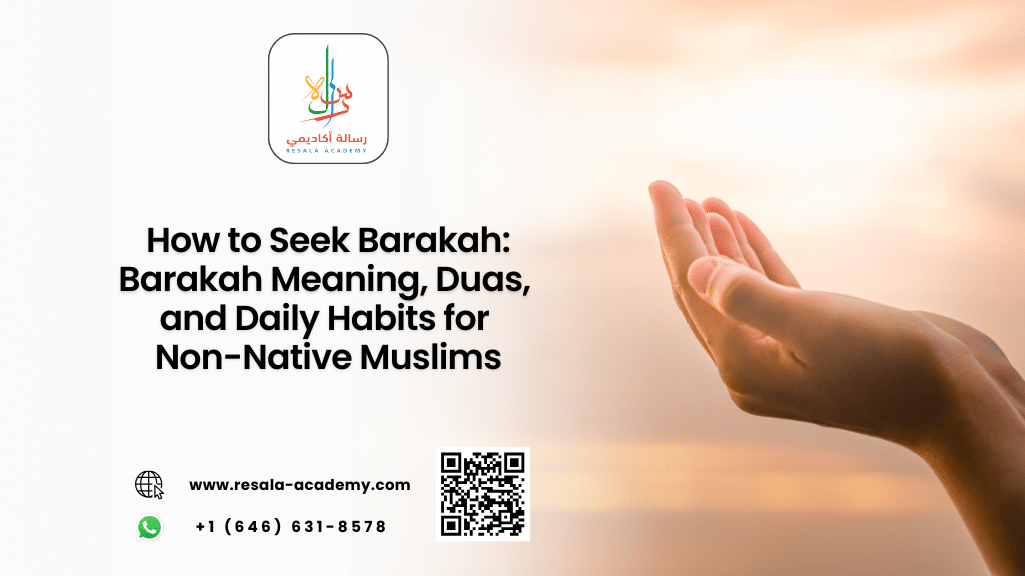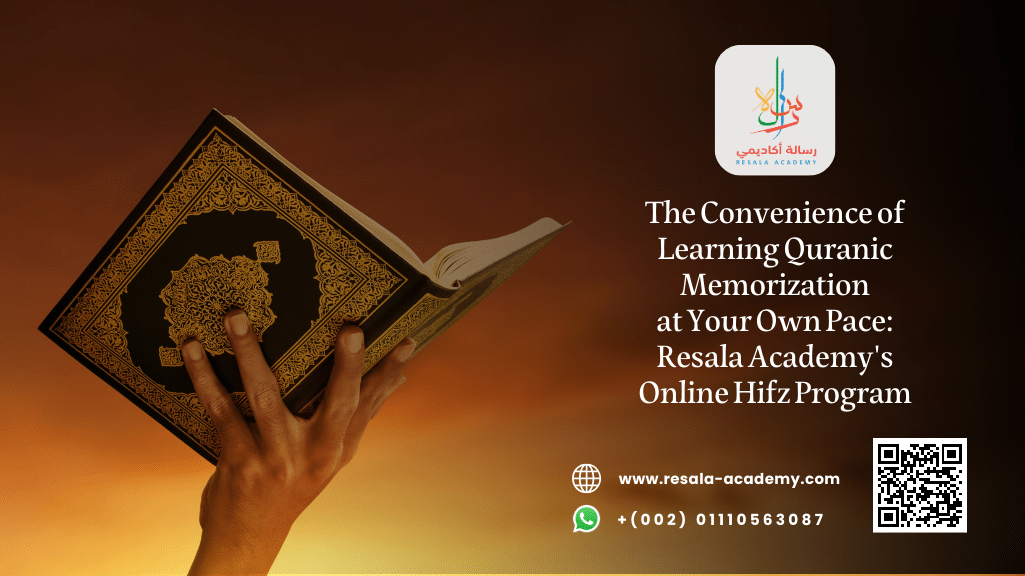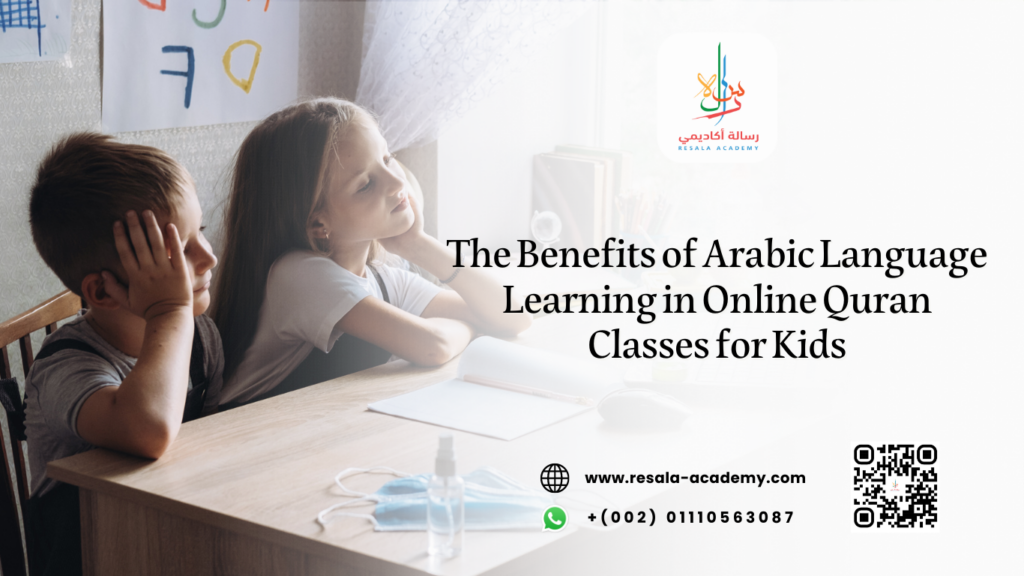Table of Contents
How to Seek Barakah: Barakah Meaning, Duas, and Daily Habits for Non-Native Muslims
In the fast-paced modern world, many Muslims—especially non-native Arabic speakers—seek a deeper connection with their faith. One of the most beautiful and profound concepts in Islam is barakah.
But what is the true barakah meaning, and how can we invite it into our lives? This comprehensive guide explores the meaning of barakah, its significance in Islam, powerful duas, and practical habits to cultivate divine blessings in your daily life.
Whether you’re a beginner in Islamic studies or passionate about learning Arabic and the Quran, this article is your gateway to understanding and embracing the essence of barakah. And if you’re looking for a trusted platform to deepen your knowledge, Resala Academy offers expert-led Arabic and Quran courses tailored for non-native speakers.
What is the Meaning of Barakah?
The term barakah (Arabic: بركة) is often translated as “blessing,” but its depth extends far beyond a simple translation. It refers to a divine increase, continuity, and spiritual presence in one’s life, wealth, time, or actions. When Allah places barakah in something, it multiplies in goodness and benefit, even if it appears small in quantity.
Barakah Meaning in Islam
In the Islamic context, barakah is a divine gift from Allah (SWT). It is not merely material abundance but a spiritual enrichment that brings peace, productivity, and purpose. The barakah meaning in Islam is closely tied to sincerity, gratitude, and obedience to Allah.
Qur’anic Reference
وَلَوْ أَنَّ أَهْلَ الْقُرَىٰ آمَنُوا وَاتَّقَوْا لَفَتَحْنَا عَلَيْهِم بَرَكَاتٍ مِّنَ السَّمَاءِ وَالْأَرْضِ
“If the people of the towns had believed and feared Allah, We would indeed have opened up to them blessings from the heavens and the earth.”
— Surah Al-A’raf 7:96
This verse shows that barakah is directly linked to faith (iman) and taqwa (God-consciousness).
The Significance of Barakah in Daily Life
Understanding the barakah meaning is essential for every Muslim who desires a life filled with divine favor. Barakah can manifest in various aspects:
- Time: Being able to accomplish more with less.
- Wealth: Experiencing contentment and sufficiency.
- Health: Enjoying wellness and energy to worship.
- Relationships: Having peace and harmony with others.
- Knowledge: Gaining deep understanding and wisdom.
Read more about: Top 7 Powerful Dua for Anxiety Every Muslim Should Know With Transliteration for Non-Native Speakers
Why Non-Native Muslims Should Learn About Barakah
Non-native speakers often struggle with connecting deeply to Arabic terms and Quranic concepts. Learning the meaning of barakah in its original context helps foster a stronger spiritual connection and appreciation for Islamic teachings. Platforms like Resala Academy bridge this gap by offering structured, accessible learning for non-Arabic speakers.
Duas to Seek Barakah from Allah
Supplication (dua) is a powerful way to invite barakah into your life. Here are some authentic duas that you can incorporate into your daily routine:
1. Dua for Barakah in Sustenance
اللَّهُمَّ بَارِكْ لَنَا فِيمَا رَزَقْتَنَا
“O Allah, bless for us what You have provided us.”
— Sunan Ibn Majah 3322
2. Dua for Barakah in Time and Effort
اللَّهُمَّ اجْعَلْ فِي أَوْقَاتِنَا بَرَكَةً
“O Allah, place barakah in our time.”
Although not a specific hadith, this is a general supplication that aligns with Islamic principles of seeking productivity and divine help.
3. Prophet’s Dua for Barakah in the Morning
اللَّهُمَّ بَارِكْ لأُمَّتِي فِي بُكُورِهَا
“O Allah, bless my Ummah in their early mornings.”
— Sunan Ibn Majah 2236
This hadith encourages starting the day early to attain barakah.
Daily Habits to Attract Barakah
Seeking barakah is not just about making duas—it’s about aligning your lifestyle with the teachings of Islam. Here are practical habits that invite divine blessings:
1. Start Your Day with Fajr
- Perform Fajr prayer on time.
- Engage in morning dhikr and Quran recitation.
- Avoid sleeping after Fajr to benefit from the Prophet’s dua for morning barakah.
2. Recite the Quran Daily
- Even a few verses daily can bring immense barakah.
- Understanding the Quran in Arabic enhances spiritual connection—Resala Academy offers specialized Quranic Arabic courses.
3. Give Charity (Sadaqah)
قُلْ إِنَّ رَبِّى يَبْسُطُ ٱلرِّزْقَ لِمَن يَشَآءُ مِنْ عِبَادِهِۦ وَيَقْدِرُ لَهُۥ ۚ وَمَآ أَنفَقْتُم مِّن شَىْءٍۢ فَهُوَ يُخْلِفُهُۥ ۖ وَهُوَ خَيْرُ ٱلرَّٰزِقِينَ
“Say, ˹O Prophet,˺ “Surely ˹it is˺ my Lord ˹Who˺ gives abundant or limited provisions to whoever He wills of His servants. And whatever you spend in charity, He will compensate ˹you˺ for it. For He is the Best Provider.”
Read more about: Sadaqah Meaning in the Quran: Verses Every Non-Native Speaker Should Know
4. Seek Knowledge
- Islamic knowledge brings barakah to your mind and soul.
- Enroll in structured programs like those at Resala Academy to grow consistently.
5. Maintain Good Character
- Be honest, kind, and forgiving.
- The Prophet ﷺ said:
مَا شَيْءٌ أَثْقَلُ فِي مِيزَانِ الْمُؤْمِنِ يَوْمَ الْقِيَامَةِ مِنْ خُلُقٍ حَسَنٍ وَإِنَّ اللَّهَ لَيَبْغَضُ الْفَاحِشَ الْبَذِيءَ
“Nothing will be heavier on the scale of the believer on the Day of Judgment than good character.”
— Tirmidhi 2002
Hidden Dimensions of Barakah: Beyond Material Gain
While many associate the barakah meaning with wealth or sustenance, Islamic teachings reveal that barakah can manifest in subtle, transformative ways that enrich a believer’s inner world. Understanding these deeper layers is essential for students of Arabic and Islamic studies who seek more than surface-level interpretations.
- Barakah in Emotional Resilience: A heart filled with barakah remains calm during trials. This spiritual strength is a divine gift that helps Muslims maintain sabr (patience) and tawakkul (trust in Allah).
- Barakah in Decision-Making: When Allah places barakah in your intellect, you’re guided to make wise, timely choices that align with your deen and dunya.
- Barakah in Spiritual Insight: Non-native learners studying the Quran may find that, despite language barriers, they experience sudden clarity and deeper understanding—this is barakah at work.
- Barakah in Community Impact: A small act, like teaching one Quranic ayah, can ripple through generations. This exponential benefit is a hallmark of the meaning of barakah in Islamic tradition.
- Barakah in Time for Worship: Those who prioritize salah and dhikr often find unexpected time for other responsibilities—an unseen increase that reflects the barakah meaning in Islam.
Barakah and the Arabic Language: Unlocking Linguistic Blessings
For non-native Muslims, learning Arabic isn’t just about grammar—it’s a gateway to experiencing the barakah meaning embedded in the Quran’s divine language. The Arabic word “barakah” itself carries rich linguistic layers that are best appreciated through structured learning.
- Root Word Insight: The triliteral root “ب ر ك” implies continuity, stability, and abundance—concepts that are central to the meaning of barakah in classical Arabic.
- Quranic Contextualization: The word “barakah” appears in multiple forms throughout the Quran, each with nuanced implications. Understanding these requires direct engagement with Arabic texts.
- Syntax and Semantics: In Arabic, word placement and sentence structure can amplify the spiritual message. Learning this through academies like Resala Academy enhances comprehension of barakah meaning Islam.
- Pronunciation and Tajweed: Proper recitation of Quranic verses that mention barakah allows learners to internalize its rhythm and divine resonance, deepening both linguistic and spiritual connection.
- Cultural Relevance: Arabic idioms and expressions often reflect the concept of barakah in everyday speech, offering learners a richer understanding of Islamic culture and values.
By diving into the Arabic roots of divine concepts like barakah, students not only gain linguistic proficiency but also unlock the spiritual treasures embedded in the Quranic language.
Resala Academy: Unlocking Divine Blessings Through Knowledge
If you’re a non-native speaker seeking to understand the Quran, Arabic, and Islamic values like barakah, Resala Academy is your ideal companion. Here’s why:
📚 Expert Teachers: Native Arabic instructors with deep Islamic knowledge.
🌍 Global Access: Learn from anywhere in the world.
🎯 Tailored Curriculum: Designed for non-native speakers at all levels.
🕋 Quran & Arabic Focus: Master the language of the Quran and understand its deeper meanings.
Join thousands of learners who’ve transformed their spiritual journey through structured, engaging, and authentic learning at Resala Academy. Book free trial now!
Frequently Asked Questions (FAQs)
1. What is the exact barakah meaning in Islam?
Barakah means divine blessing or spiritual abundance. In Islam, it refers to the unseen increase in goodness, productivity, and benefit in one’s life, time, wealth, or actions. It is a gift from Allah that brings peace and success beyond material measures.
2. How can I get barakah in my daily life?
You can attract barakah by:
- Praying on time
- Giving charity
- Reading Quran
- Making sincere duas
- Maintaining good character
- Seeking knowledge through platforms like Resala Academy
3. Is barakah mentioned in the Quran?
Yes, barakah is mentioned in several verses. For example:
“We would have opened up to them blessings (barakāt) from the heavens and the earth.”
— Surah Al-A’raf 7:96
This shows that barakah is a reward for faith and righteousness.
4. Can non-Arabic speakers truly understand the concept of barakah?
Absolutely. While Arabic adds depth, non-native speakers can grasp and experience barakah by learning its meaning and applying Islamic principles. Enrolling in programs like Resala Academy helps bridge the language gap.
5. What duas can I say to ask Allah for barakah?
Some powerful duas include:
- اللَّهُمَّ بَارِكْ لَنَا فِيمَا رَزَقْتَنَا (O Allah, bless what You have provided us)
- اللَّهُمَّ بَارِكْ لأُمَّتِي فِي بُكُورِهَا (O Allah, bless my Ummah in their early mornings)
You can learn more duas and their meanings through structured courses at Resala Academy.
Conclusion
Understanding the barakah meaning is more than a linguistic exercise—it’s a spiritual awakening. As non-native Muslims, embracing this concept can transform your daily life, relationships, and connection with Allah.
By incorporating daily habits, making heartfelt duas, and seeking knowledge, you open the doors to divine blessings. Let Resala Academy be your guide on this journey. With expert instruction and a passion for empowering non-native speakers, Resala Academy helps you not only learn Arabic and the Quran—but live by its light.




